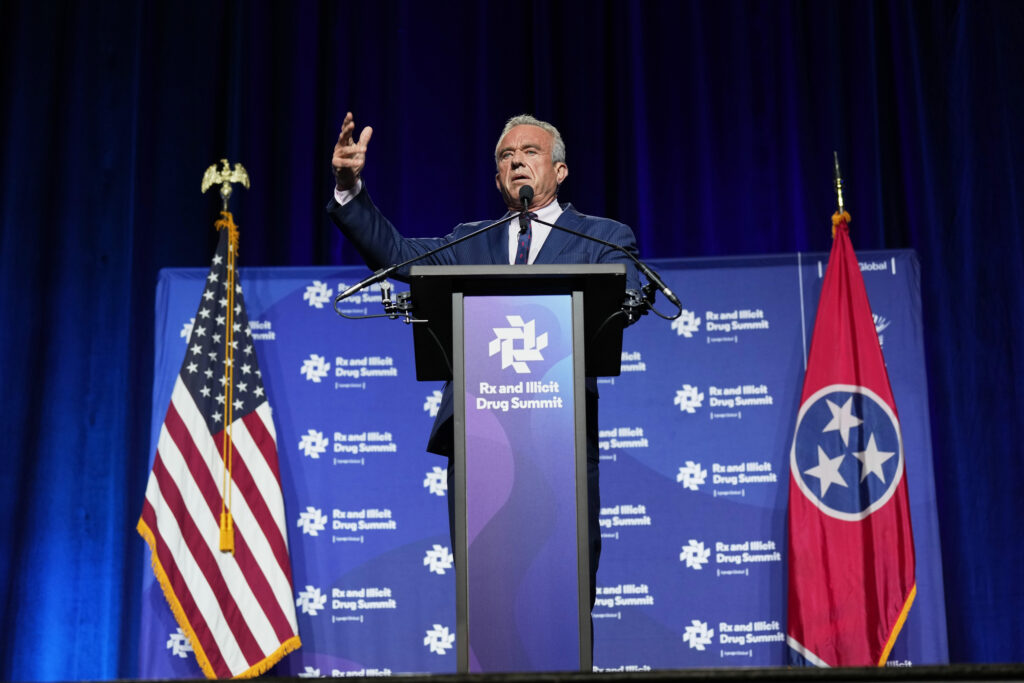
Until now, Health and Human Services Secretary Robert F. Kennedy hasn’t been particularly clear about his position on harm reduction services for opioid addiction, like medication-assisted treatment and fentanyl test strips.
He speaks publicly about his own journey out of heroin and alcohol addiction using a 12-step program.
Critics — including some in the recovery community — argue that abstinence-based approaches like 12 step programs are the only way to go. They oppose medication-assisted treatment, during which patients are prescribed safer opioids, like methadone or naltrexone, to stave off withdrawals and cravings.
Kennedy has publicly supported 12-step programs vigorously, and has proposed other abstinence-based treatments including “wellness farms.” Before his appointment as HHS secretary, he cast doubt on methadone in presidential campaign materials, according to NPR. However, during his confirmation hearing, he acknowledged that medication-assisted treatment is effective — when he was asked directly.
Today, he touted it at the RX and Illicit Drug Summit in Nashville, a large annual event for those working to address the opioid crisis.
“We have to do all of the nuts-and-bolts things that you are all involved with,” he told the crowd. “The practical, pragmatic things. We need suboxone. We need methadone. We need naltrexone.”
He also advocated for access to other measures outside of medication-assisted treatment.
“We need Narcan,” he said, referring to the overdose reversal drug. “We need good fentanyl detectors that can detect it in pills, et cetera, so that kids are less likely to overdose. We need prevention.”
Tennessee consistently ranks among the worst states for opioid overdose deaths, but that number has been turning around. Public health and addiction experts attribute that success to harm-reduction efforts like safe syringe clinics and broad access to Narcan.
More than 1,300 fewer Tennesseans died of an overdose in 2024 than the year before, according to the latest figures from the Centers for Disease Control and Prevention. That represents a roughly 30 percent drop. Tennessee’s decrease outpaced the rest of the country.
The General Assembly legalized fentanyl test strips in 2022. These small plastic sticks can go into a small sample of street drugs — like dust from scraping a pill — and detect whether it has the highly potent synthetic opioid in it. The tests are especially important for people who are attempting to ingest drugs other than fentanyl. Illicit producers have been cutting cocaine, heroine and other drugs with fentanyl because it’s so much cheaper to make.
Tennessee lawmakers also legalized Syringe Service Programs, or SSPs, a few years ago. Since then, it has been expanding permissions for them. Most recently, a new law allowed county health departments to host the clinics. They’re not allowed to use state or federal money for the needles, but they are allowed to use either local tax dollars or donations.
The state just opened its first county health department-based safe syringe program. It’s operating in East Tennessee’s Hawkins County.
Tennessee Commissioner of Health Ralph Alvarado, who also participated in the summit, said these clinics are important in both reducing overdoses and preventing the spread of infectious disease. Sharing needles can spread HIV and hepatitis, a growing problem in Tennessee. CDC data from 2022 shows that 14% of new HIV cases in the state were among people who inject drugs. In 2018, that number was just 6%.
Alvarado said stigma can prevent people from getting the help they need, and that he’s hopeful the department can open more clinics.
“They don’t feel safe,” he said. “They’re uncomfortable. And if you have a friendly face in our health department, and you can get help, that’s what we’re hoping to do,” he said.
The clinics can also connect people to treatment providers — be that medication-assisted or 12-step programs. The CDC has found that people who go to syringe clinics are five times more likely to seek treatment, and three times more likely to stop injecting drugs.
In Tennessee, there is often strong community opposition to medication-assisted treatment, especially brick-and-mortar clinics that provide it.
In one case, a local provider, Cedar Recovery, proposed a new one outside of Cookeville. State regulators held a hearing on the proposal in September, and about 100 residents made the trek to Nashville. A handful said they supported the project. They were met with criticism and some were called traitors as they walked back to their seats. Most speakers opposed the clinic, casting doubt on MAT’s efficacy, saying it threatened public safety and would bring gang violence to the area. At a different meeting about Cedar Recovery’s proposals, a supporter had the headlights broken on his car.
The first Trump administration expanded access for the treatment, especially for those enrolled in Medicaid programs like TennCare. However, the second administration’s rhetoric on opioids has focused mainly on fentanyl prosecution and border security.

